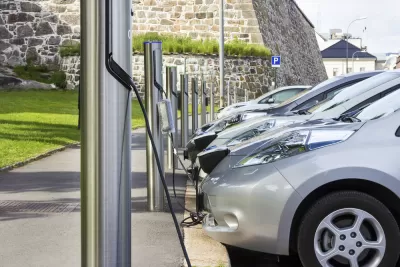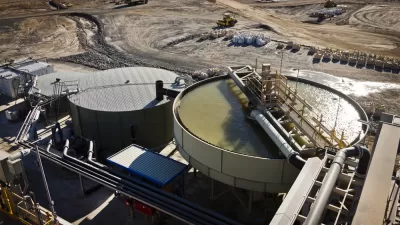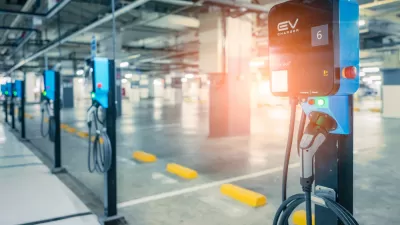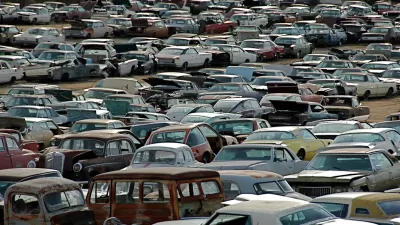Mining jobs needed to produce the metals for processing into battery parts used to build electric vehicles in America will not be developed in the U.S. but in Australia, Brazil and Canada, mainly to avoid battles with environmentalists.

Hunnicutt and Scheyder write that the main reason that the Biden administration changed its sourcing plans for the raw materials needed to process electric vehicle batteries was "to ensure the administration's EV aspirations are not imperilled as domestic mines face road blocks, the sources said, both from environmentalists and even some Democrats."
The reporters add that "the U.S. Department of Energy has awarded grants to help old coal mines find ways to produce rare earths. U.S. officials have also funded MP Materials Corp (MP.N), which owns the country's only rare earths mine, though it relies on Chinese processors."
But the bulk of Biden's approach is designed to sidestep battles with environmentalists and save capital for other fights, according to one administration source.
Reuters notes that the impact will be felt mostly by "smaller, U.S.-focused companies."
"We can no longer push the production of the products we want to places we cannot see and to people we will never meet," said Mckinsey Lyon of Perpetua Resources Corp (PPTA.TO), which is trying to develop Idaho's Stibnite mine to produce gold and antimony used to make EV battery alloys.
Partisan divide on mining
Reuters captured the opposing partisan viewpoints on mining expressed by Reps. Betty McCollum (DFL-Minn.) and Lauren Boebert (R-Colo.)
"It rings hollow when I hear everyone use this as a national defense argument, that we have to build new mines to have a greener economy," said McCollum, who has introduced legislation that would permanently block Antofagasta Plc's (ANTO.L) proposed Twin Metals copper mine in Minnesota.
"These 'not-in-my-backyard' extremists have made clear they want to lock up our land and prevent the mining of minerals," told a House Natural Resources Committee forum held the same day as Biden's Michigan visit [where he drove Ford's electric F-150 pickup truck].
Fox News anchor Dana Perino discussed the Reuters' report with guest Scott Lincicome, a senior fellow in economic studies with the Cato Institute, during America's Newsroom on May 26 and referenced the partisan controversy in a question as to why environmentalists would oppose domestic mining for metals needed for EV batteries.
"If the environmentalists are going to complain about it...They don't care that the resources would be stripped from other countries, just here in our country where we, I think, probably do it cleaner and better, and that provide jobs here? I can see why the miners are irked."
Lincicome responded that what was at stake was "the regulatory apparatus allowing people to gum up mining permitting operations, to sue to block these operations and thus giving [domestic] miners a disadvantage in the global market."
Contributor's comment: In reviewing past posts related to the electric vehicle investment component of the American Jobs Plan, it's interesting to see that the Obama administration also invested in promoting the domestic production of electric vehicles, sometimes with negative results, as the post from 2012 listed below reminds us.
Related in Planetizen:
-
Cost of Electric Vehicles Will Soon Rival Gasoline Counterparts, August 4, 2020
-
Demand for Lithium Drops as Global Electric Vehicle Sales Slump, September 7, 2019
-
Breaking News: $5 Billion Tesla Battery 'Gigafactory' Headed to Nevada, September 4, 2014
FULL STORY: Exclusive: Biden looks abroad for electric vehicle metals, in blow to U.S. miners

Study: Maui’s Plan to Convert Vacation Rentals to Long-Term Housing Could Cause Nearly $1 Billion Economic Loss
The plan would reduce visitor accommodation by 25,% resulting in 1,900 jobs lost.

North Texas Transit Leaders Tout Benefits of TOD for Growing Region
At a summit focused on transit-oriented development, policymakers discussed how North Texas’ expanded light rail system can serve as a tool for economic growth.

Why Should We Subsidize Public Transportation?
Many public transit agencies face financial stress due to rising costs, declining fare revenue, and declining subsidies. Transit advocates must provide a strong business case for increasing public transit funding.

How to Make US Trains Faster
Changes to boarding platforms and a switch to electric trains could improve U.S. passenger rail service without the added cost of high-speed rail.

Columbia’s Revitalized ‘Loop’ Is a Hub for Local Entrepreneurs
A focus on small businesses is helping a commercial corridor in Columbia, Missouri thrive.

Invasive Insect Threatens Minnesota’s Ash Forests
The Emerald Ash Borer is a rapidly spreading invasive pest threatening Minnesota’s ash trees, and homeowners are encouraged to plant diverse replacement species, avoid moving ash firewood, and monitor for signs of infestation.
Urban Design for Planners 1: Software Tools
This six-course series explores essential urban design concepts using open source software and equips planners with the tools they need to participate fully in the urban design process.
Planning for Universal Design
Learn the tools for implementing Universal Design in planning regulations.
Ascent Environmental
Borough of Carlisle
Institute for Housing and Urban Development Studies (IHS)
City of Grandview
Harvard GSD Executive Education
Toledo-Lucas County Plan Commissions
Salt Lake City
NYU Wagner Graduate School of Public Service





























